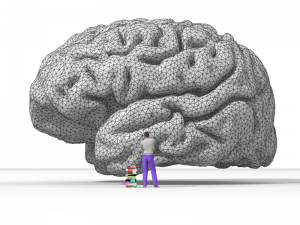 Do you think about how you think?
Do you think about how you think?
I spend a lot of time thinking about how I think. Meta-thinking, I call it.
Now before you conclude that this might lead to a never-ending thinking loop, along the lines of “lather-rinse-repeat”, let me be clear that all of this thought-about-thought has a very practical goal. What I’m trying to do is figure out ways to reduce sources of drag in my life, and I’ve come to realize that there are big pay-offs to be had as I improve how I think.
As a long-time fan of cool technology, this represents a bit of a mind shift for me. For years I had the sense that the technical tools were the more important thing when it came to my effectiveness. If I got the tools right I would be able, in effect, to delegate to them the hardest parts of my work–the thinking.
With time and experience I’ve realized that both the technology and the thinking need to be developed if I’m going to get the best possible results.
I need to be smart about the thinking, the “mental heavy lifting.” And if I have the right tools meshed effectively with my thinking, I can reach productivity nirvana: getting more of the right things done, in less time, with less stress and greater mental clarity.
Now here’s the thing. There is lots of technology out there. But there is a category of tools that is underrepresented on most people’s tool belts. They don’t have a Perspective Tool.
Recently I did some coaching with a client here in London. She has a big job, lots of responsibility, runs a global division. At home she’s a wife, mother to three little ones, and is active in her local community.
She’s pretty well equipped, technologically speaking. She has a common suite of productivity tools for email, calendar, contact management, etc. She has access to loads of internal corporate systems for reference purposes, and to external news services for keeping on top of developments in her industry. She has two very large monitors so that she can have multiple windows open at the same time. When she’s on the move she has her laptop and a smartphone.
So, no lack of tools. But as we worked together she realized that what she was missing was a tool to help her bring all of her thoughts together, to synthesize and integrate the information she was getting from her other tools. She had loads of sources of information, but lacked a tool to help her reflect and gain perspective on her work. She was missing a Perspective Tool.
Good Perspective Tools have a number of things in common:
They support synthesis and brainstorming–Perspective Tools allow you to see connections between your thoughts and to generate new ideas.
They allow you to easily get thoughts out of your head to create clear mental space–a good Perspective Tool should not enforce too much structure; it should allow you the freedom to get all thoughts, from the wacky to the profound, out of your head.
They support organizing your thoughts–once you’re ready to turn all that brainstorming into something a bit more structured, the Perspective Tool should provide you tools for connecting, sorting, and generating more detail where it’s needed.
They’re not transactional–email applications (which many people try to use as their Perspective Tool) are very limited because it’s primarily transactional: email in, email out.
They allow you to gain better perspective on your work–they raise your sights. They allow you to step back from the day-to-day transactional work to see it from a higher place.
They travel–a good Perspective Tool moves with you.
They integrate with your organizational system–once you’ve decided, say, that the next action on your project is to call Lydia, the tool allows you to get that action into your organizational system quickly.
Ask yourself whether your toolkit includes something that helps you gain better perspective. If not, then there are number of tools to choose from: mind mapping software like MindManager or iMindMap, OneNote, and Evernote are all popular options.
A good Perspective Tool can help you optimize your thinking, raise your sights and help you get more done. Have a think about your toolkit and consider whether you could do with one.

